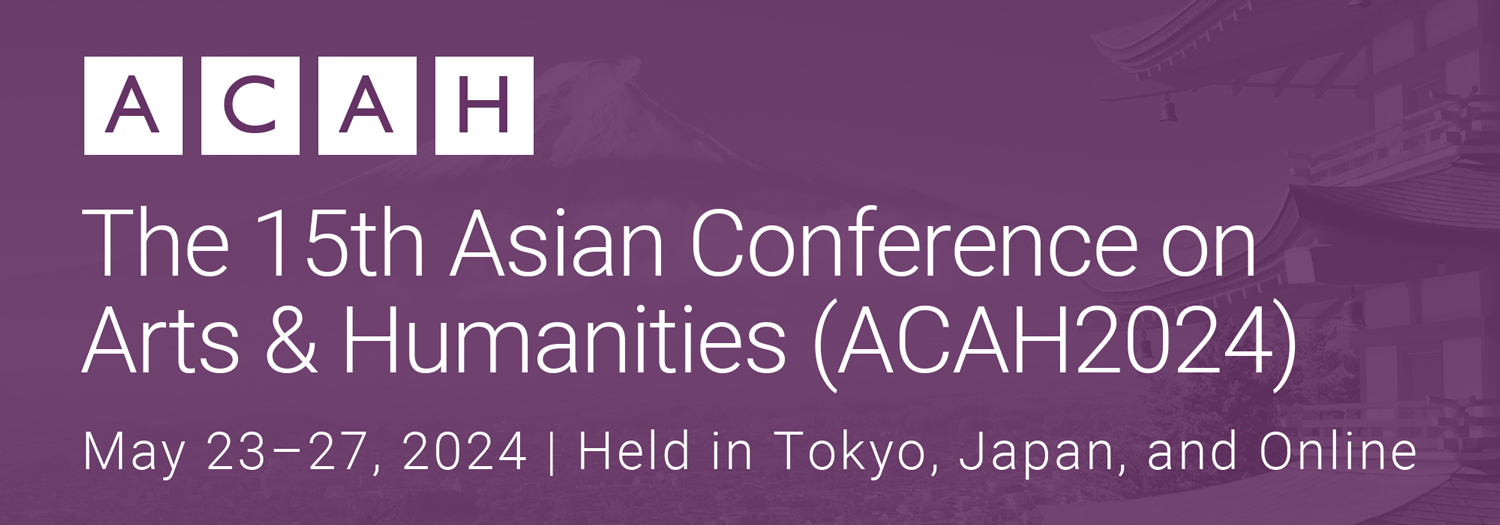The 15th Asian Conference on Arts & Humanities (ACAH2024)

ACAH is organised by IAFOR in association with the IAFOR Research Centre at the Osaka School of International Public Policy (OSIPP) in Osaka University, Japan.
Join us in Tokyo for ACAH2024!
May 23–27, 2024 | Held in Tokyo, Japan and Online
Welcome to the 15th Asian Conference on Arts & Humanities (ACAH2024).
Held in partnership with the IAFOR Research Centre at the Osaka School of International Public Policy (OSIPP) at Osaka University, this international conference encourages academics and scholars to meet and exchange ideas and views in a forum stimulating respectful dialogue. This event will afford an exceptional opportunity for renewing old acquaintances, making new contacts, networking, and facilitating partnerships across national and disciplinary borders.
Since its founding in 2009, IAFOR has brought people and ideas together in a variety of events and platforms to promote and celebrate interdisciplinary study, and underline its importance. Over the past year we have engaged in many cross-sectoral projects, including those with universities (the University of Barcelona, Hofstra University, UCL, University of Belgrade and Moscow State University), a think tank (the East-West Center), as well as collaborative projects with the United Nations in New York, and here, with the Government of Japan through the Prime Minister’s office.
With the IAFOR Research Centre, we have engaged in a number of interdisciplinary initiatives we believe will have an important impact on domestic and international public policy conversations. It is through conferences like these that we expand our network and partners, and we have no doubt that ACAH2024 will offer a remarkable opportunity for the sharing of research and best practice, and for the meeting of people and ideas.
The 15th Asian Conference on Arts & Humanities (ACAH2024) will be held alongside The 14th Asian Conference on Cultural Studies and The 15th Asian Conference on the Social Sciences. Registration for either conference will allow delegates to attend sessions in the other.
– The Conference Programme Committee
Dr Grant Black, Chuo University, Japan
Dr Joseph Haldane, The International Academic Forum (IAFOR), Japan
Professor Bradley J. Hamm, Medill School of Journalism, Northwestern University, United States
Professor Donald E. Hall, University of Rochester, United States
Professor Fan Li, LePing Social Entrepreneur Foundation & Stanford Social Innovation Review (SSIR), China
Professor James W. McNally, University of Michigan, United States & NACDA Program on Aging
Professor Sela V. Panapasa, University of Michigan, United States
- Location & Venue: Held in Tokyo, Japan and Online
- Dates: Thursday, May 23, 2024 to Monday, May 27, 2024
- Early Bird Abstract Submission Deadline: December 08, 2023*
- Final Abstract Submission Deadline: February 23, 2024
- Registration Deadline for Presenters: April 05, 2024
*Submit early to take advantage of the discounted registration rates. Learn more about our registration options.
If you would like to receive email updates for ACAH, please join our mailing list. If you have any questions, please contact us at acah@iafor.org.
About IAFOR
“Inspiring Global Collaborations”
Founded in 2009, The International Academic Forum (IAFOR) is a politically independent non-partisan and non-profit interdisciplinary think tank, conference organiser and publisher dedicated to encouraging interdisciplinary discussion, facilitating intercultural awareness and promoting international exchange, principally through educational interaction and academic research. Based in Japan, its main administrative office is in Nagoya, and its research centre is in the Osaka School of International Public Policy (OSIPP), a graduate school of Osaka University. IAFOR runs research programs and events in Asia, Europe and North America in partnership with universities and think tanks, and has also worked on a number of multi-sector cooperative programs and events, including collaborations with the United Nations and the Government of Japan. Read more about IAFOR.



